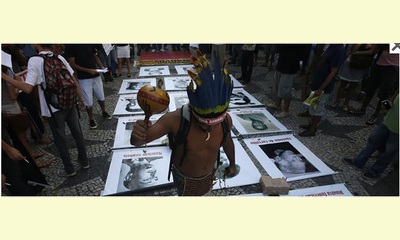|
|
Brazil: Truth Commission details ‘Dirty War’ Atrocities, Calls for Prosecutions
un article par Human Rights Watch
The release of the final report by Brazil’s National
Truth Commission is a major step toward
addressing the atrocities committed during the
country’s military dictatorship (1964-1985),
Human Rights Watch said today. 
A native Indian walks over pictures of people disappeared during the military dictatorship in Brazil at a protest against the 49 year anniversary of the 1964 military coup, in Rio de Janeiro on April 1, 2013. © 2014 Reuters
click on photo to enlarge
The report identifies 377 individuals, close to 200
of them still alive, as responsible for human rights
violations during that period, which it considers
constitute crimes against humanity, including
torture, killings, and enforced disappearances.
The commission found that the violations
constituted “widespread and systematic actions”
and were carried out as part of a “government
policy” planned and ordered by officials at the
highest level.
“The commission has made a major contribution
by providing an authoritative and long-overdue
account of the horrible crimes that took place
during the dictatorship,” said Maria Laura
Canineu, Brazil director at Human Rights Watch.
“Just as important, it has pointed the way to the
next crucial step that Brazil needs to take: making
sure that those who committed atrocities are
finally brought to justice.”
The Truth Commission increased the count of
people dead or disappeared during the “Dirty
War” years to 434, whereas the official number
previously stood at 362. The new figure includes
191 people killed, 210 disappeared, and 33 who
were disappeared but whose bodies were later
recovered. The commission only included cases it
could corroborate, and concluded that the actual
number of victims would have been higher if it had
access to Armed Forces documents that the
Defense Ministry says have been destroyed.
The report contains harrowing accounts of the
suffering of hundreds of Brazilians detained and
tortured by members of the Armed Forces and
police, many of whom were never seen again.
One was Joaquim Alencar de Seixas, a leader of
an armed group, the Tiradentes Revolutionary
Movement, who was detained along with his wife
and three of his children. Seixas and his 16-year-
old son were tortured side by side in a military
installation in São Paulo, where officers applied
electric shocks to their genitals and other organs,
and subjected them to the infamous pau de arara,
a torture technique that causes severe pain in
which the victim is suspended from a horizontal
pole. The report says that Seixas must have died
during one of the torture sessions. The authorities
said at the time that he was killed when he tried to
escape.
Official reports routinely covered up the killings,
instead attributing the deaths to suicides,
accidents, or casualties in exchanges of gunfire,
the commission said.
The document also reports cases of rape;
torturing of pregnant women, some of whom had
miscarriages as a result; the use of insects, like
cockroaches, introduced in the victim’s bodies;
and psychological torture, such as threats against
family members.
The dictatorship targeted not only members of
armed groups, but also critics, academics, clergy,
trade unionists, rural workers, military officers who
advocated a return to democracy, and members
of minority and vulnerable groups.
(This article is continued in the discussionboard)
( Click here for a version in Portuguese.)
|








|
DISCUSSION
Question(s) liée(s) à cet article:
Truth Commissions , Do they improve human rights?
* * * * *
Commentaire le plus récent:
The following is excerpted from an article by Ernesto Semán, professor at the University of Richmond in the U.S. He looks at the recent torture report to the U.S. Senate in the light of the history of U.S. implication in the torture that took place in previous decades in Latin America. As he points out, the torture is only the most recent expression of American policies that amount to a form of state terrorism.
. . . instead of accepting the significance of the war on terror in undermining the rule of law, the report has served the Obama administration as another component of an ideological spinning wheel. . ... continuation.

|
|









